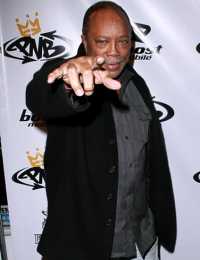Quincy Delightt Jones, Jr. (born March 14, 1933) is an American record producer and musician. A conductor, musical arranger, film composer, television producer, and trumpeter. His career spans five decades in the entertainment industry and a record 79 Grammy Award nominations, 27 Grammys, including a Grammy Legend Award in 1991. He is particularly recognized as the producer of the album Thriller, by pop icon Michael Jackson, which has sold more than 110 million copies worldwide, and as the producer and conductor of the charity song “We Are the World”.
In 1968, Jones and his songwriting partner Bob Russell became the first African Americans to be nominated for an Academy Award for Best Original Song "The Eyes of Love" from the Universal Pictures film Banning. That same year, he became the first African American to be nominated twice within the same year when he was nominated for Best Original Score for his work on the music of the 1967 film In Cold Blood. In 1971, Jones would receive the honor of becoming the first African American to be named musical director/conductor of the Academy Awards ceremony. He was the first African American to win the Academy's Jean Hersholt Humanitarian Award, in 1995. He is tied with sound designer Willie D. Burton as the most Oscar-nominated African American, each of them having seven nominations. At the 2008 BET Awards, Quincy Jones was presented with the Humanitarian Award. He was played by Larenz Tate in the 2004 biopic about Ray Charles, Ray.
In 1956, Jones toured again as a trumpeter and musical director of the Dizzy Gillespie Band on a tour of the Middle East and South America sponsored by the United States Information Agency. Upon his return to the United States, Jones got a contract from ABC-Paramount Records and commenced his recording career as the leader of his own band.
In 1957, Quincy settled in Paris where he studied composition and theory with Nadia Boulanger and Olivier Messiaen. He also performed at the Paris Olympia. Jones became music director at Barclay Disques, the French distributor for Mercury Records.
During the 1950s, Jones successfully toured throughout Europe with a number of jazz orchestras. As musical director of Harold Arlen's jazz musical Free and Easy, Quincy Jones took to the road again. A European tour closed in Paris in February 1960. With musicians from the Arlen show, Jones formed his own big band, called The Jones Boys, with 18 artists—plus their families—in tow. The band included jazz greats Eddie Jones and fellow trumpeter Reunald Jones, and organized a tour of North America and Europe.
Though the European and American concerts met enthusiastic audiences and sparkling reviews, concert earnings could not support a band of this size, and poor budget planning made it an economic disaster; the band dissolved and the fallout left Jones in a financial crisis. Quoted in Musician magazine, Jones said about his ordeal, "We had the best jazz band in the planet, and yet we were literally starving. That's when I discovered that there was music, and there was the music business. If I were to survive, I would have to learn the difference between the two." Irving Green, head of Mercury Records, got Jones back on his feet with a personal loan and a new job as the musical director of the company's New York division, where he worked with Doug Moody, who would later go on to form Mystic Records.
While working on the film The Wiz, Michael Jackson asked Jones to recommend some producers for Jackson's upcoming solo record. Jones offered some names, but eventually asked Jackson if he would like for him to produce the record. Jackson replied that he would, and the result, Off The Wall, has sold approximately 20 million copies and made Jones the most powerful record producer in the industry. Jones's and Jackson's next collaboration Thriller has sold a reputed 110 million copies and has become the highest-selling album of all time. Jones also worked on Michael Jackson's album Bad, which has sold 32 million copies. After the Bad album, Jones recommended Jackson to New Jack Swing inventors Teddy Riley and Babyface so Jackson could "update" his sound.
In a 2002 interview, when Jackson was asked if he would ever work with Jones again he replied, "The door is always open". However, in 2007, when NME.COM asked Jones a similar question, he said "Man, please! We already did that. I have talked to him about working with him again but I've got too much to do. I've got 900 products, I'm 74 years old."
Jones first worked with Frank Sinatra when he was invited by Princess Grace to arrange a benefit concert at the Monaco Sporting Club in 1958. Six years later, Sinatra hired him to arrange and conduct Sinatra's second album with Count Basie, It Might as Well Be Swing (1964). Jones conducted and arranged 1966's live album with the Basie Band, Sinatra at the Sands. Jones was also the arranger/conductor when Sinatra, Sammy Davis, Jr., Dean Martin, and Johnny Carson performed with the Basie orchestra in St. Louis, Missouri, in a benefit for Dismas House in June 1965. The fund-raiser was broadcast to a number of other theaters around the country and eventually released on DVD. Later that year, Jones was also the arranger/conductor when Sinatra and Basie appeared on The Hollywood Palace TV show on October 16, 1965. Nineteen years later, Sinatra and Jones teamed up for 1984's L.A. Is My Lady, after a joint Sinatra-Lena Horne project was abandoned.
